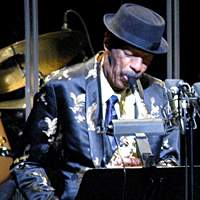One of the most controversial and innovative musicians in jazz, Ornette Coleman virtually defined the avant-garde, along with Cecil Taylor and John Coltrane. Their work in the 1960s found ways forward when jazz started to languish and left little musical territory unexplored. Among the many jazz radicals of the time, Coleman was always the most elusive and ironic, as well as the most self-confident, proudly titling his '60s releases "Something Else!!!," "The Shape of Jazz to Come" and "Change of the Century."
He plays a rare tour of Japan starting next week to show why those 40-year-old titles remain accurate.
Coleman's 1960 recording "Free Jazz" established that genre as less a category than a range of approaches and musical attitudes. Coleman freed his music from hitherto rigidly followed chord changes, dispensing with piano and sometimes doubling-up instruments (two drums, two basses, two trumpets) for an unruly sound that favored melodies over harmonies.
It was, and continues to be, a radically new emphasis. Not only have his compositions and "harmolodic" theories become essential components of modern jazz, but Coleman has continued to play and evolve: In the 1970s his electric band Prime Time may have been less radical, but it was a lot more fun; his SoHo loft jams inspired, and educated, a new generation.
Of Coleman's playing, Charles Mingus once said: "It's organized disorganization; he plays wrong right." Not to be missed, Coleman doesn't give concerts -- he gives events.

















With your current subscription plan you can comment on stories. However, before writing your first comment, please create a display name in the Profile section of your subscriber account page.